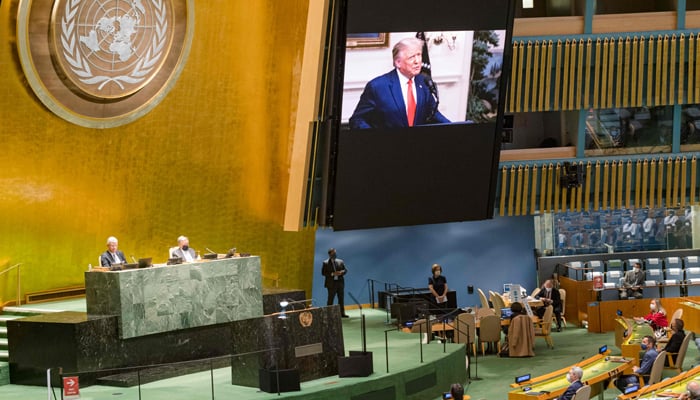Donald Trump slams China as UN chief warns against new 'Cold War'

UNITED NATIONS, US: United States President Donald Trump lased out at China over the COVID-19 pandemic in an address on Tuesday before the United Nations, whose chief warned against a new "Cold War" between the two powers.
At a General Assembly held almost entirely virtually due to COVID-19, Trump delivered a speech in full election campaign mode, even using his loaded term "China virus."
"We must hold accountable the nation which unleashed this plague onto the world — China," Trump said in a recorded address to the General Assembly, where each nation was represented by a single, masked delegate.
Trump, who pulled the United States out of the Paris climate accord, attacked China for its carbon emission as well as dumping of plastic.
"Those who attack America's exceptional environmental record while ignoring China's rampant pollution are not interested in the environment. They only want to punish America. And I will not stand for it," he said.
Trump renewed his criticism of China's role in the respiratory disease, news of which was suppressed when cases first emerged late last year in Wuhan.
"The Chinese government, and the World Health Organization — which is virtually controlled by China — falsely declared that there was no evidence of human-to-human transmission," Trump said, referring to initial statements by the UN health body that it later revised.
Trump has given notice that the United States is pulling out of the World Health Organization.
Washington has been the greatest contributor to the health body, which has tackled polio, malaria and other illnesses around the world
Critics say Trump is trying to shift blame for his handling of COVID-19 in the United States — where nearly 200,000 people have died, more than in any other country.
His Democratic rival in November 3 elections, Joe Biden, has vowed to keep the United States in the WHO if he wins.
'Great Fracture'
Leaders were asked to send in videos days in advance to avoid technical glitches, meaning Chinese President Xi Jinping could not offer a spontaneous response if he wished.
But China's ambassador to the United Nations, Zhang Jun, said as he introduced Xi's speech that Beijing "rejects the unfounded claims" from Trump.
Xi, in a mild-mannered speech delivered before a painting of the Great Wall, warned the world not to "politicize" the fight against coronavirus.
Xi said that China would contribute another $15 million to a UN fund on coronavirus.
"China has no intention of entering a Cold War," he said, urging the world to avoid "falling into the trap of a clash of civilizations."
UN Secretary-General Antonio Guterres, opening the General Assembly, also warned of the risks of rising tensions between the United States and China.
"We must do everything to avoid a new Cold War," Guterres said.
"We are moving in a very dangerous direction. Our world cannot afford a future where the two largest economies split the globe in a Great Fracture — each with its own trade and financial rules and internet and artificial intelligence capacities."
The Trump administration has launched a global campaign against the influence of China, pushing back on its claims in the South China Sea and warning nations of the risks of accepting its lavish infrastructure spending.
Guterres also criticized nationalist approaches to the coronavirus, without naming Trump or other world leaders.
"Populism and nationalism have failed. Those approaches to contain the virus have often made things manifestly worse."
Brazilian President Jair Bolsonaro, who has contracted COVID himself, used his address to accuse his nation's media of spreading panic.
The UN General Assembly in normal years draws about 10,000 people from around the world, a prospect that is unthinkable at a time when nations have imposed strict entrance requirements to prevent the spread of COVID-19, which has claimed nearly 950,000 lives.
With no chance for in-person meetings and the give-and-take of negotiations, some UN-based diplomats wonder how much can be achieved, although side meetings are scheduled virtually on key issues including the coronavirus response.


tinyurlis.gdclck.ruulvis.netshrtco.de
